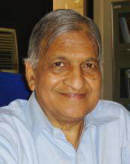
Convergence of Values - Spiritual, Political & Economic
Prof. Ashish Bose, chaired this session also.
Ms Eszter Szabo
“We must not believe that any economic, political, military or any other system will bring peace and prosperity to the world. Only a rising level of consciousness of humanity can bring about transformation that will make this possible”
An economic system that is designed in consonance with cosmic or divine law can prepare the conditions for the elevation of this consciousness. The project goals are to support the current planetary shift of consciousness which is from a mechanistic, materialistic mode of thinking to a spiritual one and to provide a new definition to the science of economics based on aparigraha. In the current mode of thinking, matter and self-perception dominates whereas the new paradigm treats man as a mental, emotional and spiritual entity besides being a physical one. It has spiritual laws and the goal of life is self-realization. The principles of this paradigm are co-operation, ahimsa, aparigraha and dharma. The main tenet of aparigraha economics is to respect and live by spiritual laws in our economic relations with each other.
We have two main socio-economic systems- capitalism and Communism and both have failed miserably by perpetuating greed and generating economic war like conditions. Shift of consciousness is thus inevitable to replace current exploitation and degradation with egalitarianism, liberalization and evolution. The underlying aspect of this spiritual-eco paradigm is that human beings are entrusted with the responsibility to make possible the sustenance and evolution of all fellow beings.
The west has its own spiritual wisdom, very much on the lines of what the east has. The material and spiritual sciences co-exist in both the cultures, having their own axioms, principles, assumptions and precepts.
Elaborating on spiritual science, she said that it addresses all aspects of creation and relationships among these parts. It advises us on how to lead a fulfilling life. This “perennial truth” is the basis of all other sciences and helps us realize unity in diversity. The primary teaching of the spiritual science proposes that man has a transient body, but an eternal spirit, which is a part of God. It emphatically speaks about fraternity. Most important virtue, according to this science is co-operation, which is, sharing of resources. Violation of this leads to selfishness, isolation and unhappiness.
Religion teaches us that wealth is the trust of God. It’s the duty of those who possess more to share it with those who have less. The same is followed by reward, or punishment otherwise.
Love, she opines, is the most potent force in the universe. It is defined in action as selfless service or dharma. Similarly, ahimsa means true actions of non-violence in economic relations.
Ms. Szabo discussed three models that have a spiritual basis.
- Humanitarian
- Spiritual
and - Economic model
The first model is 2000 years old where the definition of economy is the best employment of values for the wants of life. It emphasizes the element of virtues.
The second model is proposed by a teacher in the west by the name of Robert Steiner. According to this, man is a three fold being whose capacities are wisdom, love and will. According to this three foldness, there is a three fold social order. Economic life which is based on altruism or fraternity, rides on responsibilities.
The third model is actually a model given by a yogi called Sharker. The model is being tried in South America and promoted in USA. It’s called as Progressive Utilization Theory (PROUT), which states that the economy should meet the basic needs of people and rationally distribute the world’s resource within the carrying capacities of the planetary ecosystem. Economic democracy forms the bedrock of this model.
 Dr. Ashok Bapna
Dr. Ashok Bapna